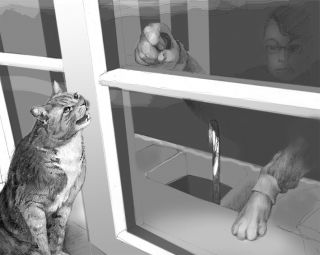Identity
Cats Get Bad Press (Again)
'It's taken me nine years to admit, but: I am a cat hater: I hate my cat'
Posted February 4, 2015
It's official. Caitlin Moran (pronounced Cat-Lin*, ironically), best-selling neo-feminist writer and award-winning columnist for The (London) Times, hates her cat. That's the headline, but it turns out that she's actually confessed to hating just one of her cats: she cohabits with a pair of littermates, Betty and Clothy, and so far it's only Betty she's chosen to vilify, casting Clothy in the role of innocent victim.
That's not so much hating cats as taking sides, but there are plenty of genuine cat haters out there who will have been cheering as they read Ms Moran's column over the weekend. Despite the apparent ubiquity of cute cats on the internet, around one in twenty people finds cats repellent in a fundamental way that seems to bracket them with snakes, hairy spiders and cockroaches. So, no, Caitlin, not everyone loves cats.
Cats are, however, among the most misunderstood of animals, especially given how popular they are nowadays. The gap between what cats are actually thinking and what we think they're thinking may even be getting wider, as their internet avatars supplant reality. In real life, cats are not little fluffy people. Nor are they cynical, scheming minxes. They are cats, and their world is not the same as ours.
Ms. Moran berates Betty for hissing at Clothy for a couple of weeks after Clothy returned from the hospital after 'massive surgery'. This sort of thing happens all the time, because cats recognise one another by smell, not looks. There's nothing as identity-changing for a cat as being chemically transmogrified by modern veterinary procedures. Imagine, Caitlin, how you would react if your husband inexplicably disappeared for a week and then reappeared, equally abruptly, with a completely different face, albeit one that gradually resumed its regular physiognomy over the next fortnight or so. You might get a little edgy yourself.
Betty does appear to be an emotionally needy cat. She is certainly guilty of breaching the preconception that cats are emotionally self-contained (not that cats—or dogs—are capable of feeling "guilt", their "guilty looks" are all in our anthropomorphic imagination). In Ms Moran's account, Betty has three particularly annoying habits: 'fawning over visitors', kneading Ms Moran's face when she's in bed (neither of these is unusual for that kind of cat), and (this is a new one, at least for me) dipping her paw 'up to the cat ankle' in receptacles containing 'consuming liquids—tea, water, milk or gin' intended for human consumption.

Ms Moran reports her response to such transgressions as variations on 'lightly chucking her' off/away etc. In my experience, repeatedly 'chucking' a cat is likely to have one of two consequences. One, the cat will dislike the experience intensely and eventually decide to move in with the next door neighbour. Two, it will at least provide the physical contact the cat craves—and it may even remind the cat of games it enjoyed with its mum when it was a kitten. Either way, it will come back for more. Caitlin, since Betty is still with you, I suspect the latter. Yes, without realising it, you have actually trained her to do this 'nobbish' stuff.
Again, despite their image, cats learn a great deal from their owners. Even if the result isn't quite what the owner intended, it will always turn out to make perfect sense so far as the cat is concerned. And it naturally follows that because they're such good learners, cats can be trained to desist from any annoying habits that they've picked up, whether from their owners or elsewhere. How this can be done is beyond the scope of this post, but all should be revealed next year.
(Disclaimer: 'chucking'—throwing—cats is risky for both chucker and chuckee, and does not appear in my or any other list of approved training methods. The other kind of 'chucking'—tickling under the chin—is usually fine).
*lin - Old English for "avoid"


